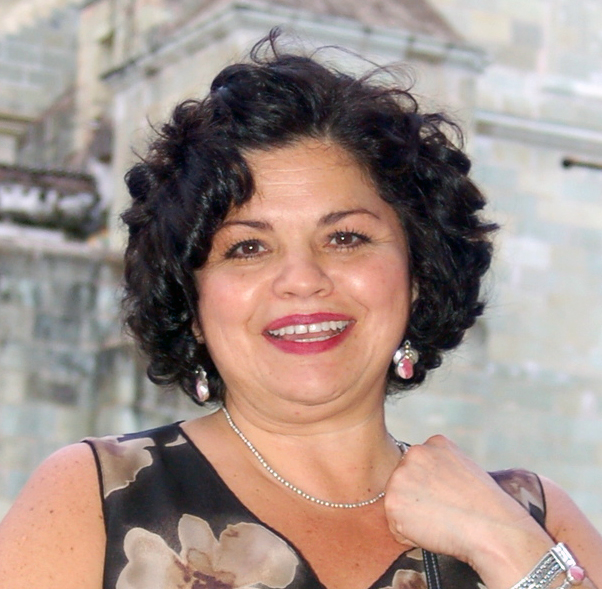
Leila Flores Dueñas received her Ph.D. in Curriculum and Instruction from the University of Texas at Austin in Multilingual Studies in Education. She is currently an associate professor in the University of Mexico’s Department of Chicana and Chicano Studies, where she serves as the Director of Graduate Studies (face-to-face program) and teaches courses in “Qualitative Research and Data Analysis” and “Chicana/o–Latina/o Musical Cultures and Expressions.” She also has a long history of teaching social justice in education, culturally relevant pedagogies, community-based research, and Folklor en el Aula (Folklore in the classroom), among others. Her current research applies the frameworks of expressive critical literacies to analyze cultural and artistic production/performance within Borderland communities and schools. Leila is the founder of Chamisa: A Journal of Literary, Performance, and Visual Arts of the Greater Southwest (University of New Mexico), supported by UNM’s Southwest Hispanic Research Institute (SHRI).
Dr. Flores Dueñas has analyzed, curated, and performed songs and corridos from the Mexican Revolution to focus on the grit of soldadera combatientes (soldier women) and their roles in the war (1910-1920). In her current work, she is analyzing historical photos of the Casasola collection with Anzaldúa’s notion of nepantla en el mundo zurdo, she focuses on the gaze of these women who lived out their lives as Trans individuals.
Internationally, Dr. Flores-Dueñas has collaborated and published on various Latin American international research and service projects with institutions such as the Trilateral (US/Canada/Mexico) Teacher Education in Urban Contexts Project with the Organization of American States (OAS)/Organización de Estados Americanos (OEA); Simposio Interamericano de Investigación Etnográfica en Educación; International Congress of Americanists (ICA), International Reading Association (IRA), Secretaría de Educación Pública (SEP) del Estado de San Luis Potosí; Universidad Pedagógica de San Luis Potosí, Escuela FOVISSTE, SLP; Latin American Network in Government and Public Policy (LAT-neT); International Transformative Learning Conference; American Education Studies Association (AESA); Secretaría de Educación Pública (SEP)- Universidad Pedadógica Nacional (UPN), Mexico City, Mexico; Diplomado Educacional con Miembros de Instituto de Formación para el Trabajo del Estado de Jalisco (IDEFT) Guadalajara, México; Colegio de Bachilleres del Estado de Jalisco (Guadalajara, México), Simposio Internacional de Bilingüismo y Educación Bilingüe en América Latina (BILINGLATAM, Oaxaca, México), and Centro de Investigaciones y Estudios Superiores en Antropologia Social (CIESAS) para Educacion Bilingue e Intercultural.
Additionally, Leila has been interested in how Chicanx communities have historically utilized cultural/linguistic knowledge, social networks, and the arts to overcome racism and linguicism while pursuing equity in education and gendered norms. Dr. Flores-Dueñas has been recognized for her work with mexicana immigrant mothers in a community-engaged family literacy program, her leadership with ENLACE: Hispanic Teacher Pipeline (Kellogg Grant), her creative bilingual and ESL teacher preparation/practice in marginalized Spanish/English and Native American Pueblo Schools, and for her dedication to mentoring First Generation Latinas/Chicanas.
Leila is also a performer with Carol Y. Vigil and together, they make up the singing duo Las Flores del Valle, who study women composers, music about women in the Southwest and New Mexico, community music, and history of corridos related to las soldaderas of the Mexican Revolution (1910-1920). She also plays the upright bass and sings in UNM’s Colectivo de Son Jarocho, directed by Maestra Laura Rebolloso Cuellar.
- Dr. Flores Dueñas is the founder of Chamisa: A Journal of Literary, Performance, and Visual Arts of the Greater Southwest (University of New Mexico), supported by UNM’s Southwest Hispanic Research Institute (SHRI).
- Dr. Flores-Dueñas has collaborated and published on various Latin American international research and service projects with institutions such as the Trilateral (US/Canada/Mexico) Teacher Education in Urban Contexts Project with the Organization of American States (OAS)/Organización de Estados Americanos (OEA); Simposio Interamericano de Investigación Etnográfica en Educación; International Congress of Americanists (ICA), International Reading Association (IRA), Secretaría de Educación Pública (SEP) del Estado de San Luis Potosí; Universidad Pedagógica de San Luis Potosí, Escuela FOVISSTE, SLP; Latin American Network in Government and Public Policy (LAT-neT); International Transformative Learning Conference; American Education Studies Association (AESA); Secretaría de Educación Pública (SEP)- Universidad Pedadógica Nacional (UPN), Mexico City, Mexico; Diplomado Educacional con Miembros de Instituto de Formación para el Trabajo del Estado de Jalisco (IDEFT) Guadalajara, México; Colegio de Bachilleres del Estado de Jalisco (Guadalajara, México), Simposio Internacional de Bilingüismo y Educación Bilingüe en América Latina (BILINGLATAM, Oaxaca, México), and Centro de Investigaciones y Estudios Superiores en Antropologia Social (CIESAS) para Educacion Bilingue e Intercultural.

